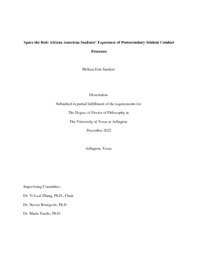
ATTENTION: The works hosted here are being migrated to a new repository that will consolidate resources, improve discoverability, and better show UTA's research impact on the global community. We will update authors as the migration progresses. Please see MavMatrix for more information.
Show simple item record
| dc.contributor.advisor | Zhang, Yi Leaf | |
| dc.creator | Sanders, Melissa | |
| dc.date.accessioned | 2023-01-26T16:15:44Z | |
| dc.date.available | 2023-01-26T16:15:44Z | |
| dc.date.created | 2022-12 | |
| dc.date.issued | 2022-12-20 | |
| dc.date.submitted | December 2022 | |
| dc.identifier.uri | http://hdl.handle.net/10106/31047 | |
| dc.description.abstract | Although African Americans enroll at postsecondary institutions at similar rates as other ethnic groups, consistently, they lag in degree completion. This has led to lower wages, fewer employment opportunities, and higher health disparities among African Americans. Consequently, the literature is full of studies attempting to increase Black student degree attainment. This includes their perception of campus climates, academic preparedness, and sense of belonging. However, other opportunities to promote and encourage African American scholastic success, such as the disciplinary process, are understudied. To address this gap, I utilized a phenomenological qualitative study to examine the way African Americans perceived the impact of the discipline process on their academic experience. Using campus ecology theory (Banning, 1978) as the theoretical lens, I identified three main themes from the participant’s responses, including (1) African American students’ perceptions of their encounters with conduct personnel, (2) value of disciplinary sanctions, and (3) their experience with discipline policies and how it shaped and transformed the way these students interacted with their campus environment. The findings suggest that student participation in the discipline process can significantly influence the academic environment experienced by African American students. This includes the development of relationships with staff and adapting to the campus environment to fit student needs. These findings affirm the impact of out the classroom experiences can have on scholastic achievement. This study adds to the insufficient number of studies examining disciplinary processes. The results suggest the importance of an individualized approach to addressing student behavior and the categorizing of institutional policies when managing misconduct. Further, the findings indicate that additional study is needed to understand additional factors influencing students, such as developing skills after participation in the conduct process. | |
| dc.format.mimetype | application/pdf | |
| dc.language.iso | en_US | |
| dc.subject | Discipline | |
| dc.subject | Student conduct | |
| dc.title | Spare the Rod: African American Students’ Experience of Postsecondary Student Conduct Processes | |
| dc.type | Thesis | |
| dc.date.updated | 2023-01-26T16:15:44Z | |
| thesis.degree.department | Educational Leadership and Policy Studies | |
| thesis.degree.grantor | The University of Texas at Arlington | |
| thesis.degree.level | Doctoral | |
| thesis.degree.name | Doctor of Philosophy in Educational Leadership and Policy Studies | |
| dc.type.material | text | |
Files in this item
- Name:
- SANDERS-DISSERTATION-2022.pdf
- Size:
- 1.213Mb
- Format:
- PDF
This item appears in the following Collection(s)
Show simple item record


